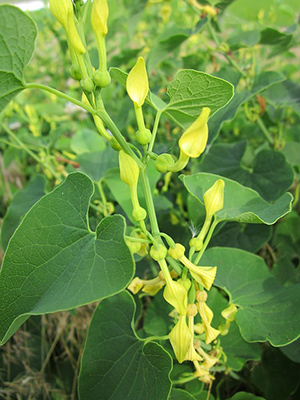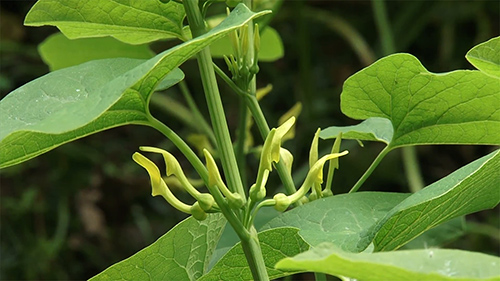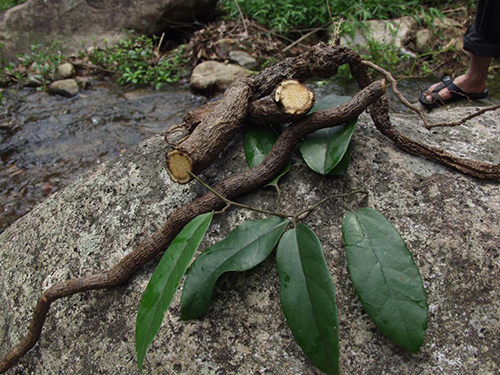Contents

Hippocrates used the birchwort plant for difficult labor two thousand five hundred years ago. Hence, its Greek etymology is aristos (excellent) and lokios (labor). Its internal use has decreased due to its irritant effects on the digestive system.
Birchwort Plant Scientific Plant
- Other names: Aristolochia root, upright birthwort.
- French: Aristoloche ciematite.
- Spanish: Aristoloquia.
- Environment: Frequent in calcareous soils and vineyards in central and southern Europe. It is occasionally found in some warm areas of America.
- Description: The vibrant plant of the Aristolochiaceae family grows from 30 to 70 cm high. All of the plants have an unpleasant smell. It has pale yellow tube-shaped flowers.
- Parts of the plant used medicinally: The leaves and flowers, and the root when dry.
Healing Properties and Warning

The plant contains aristolochic acid and aristolochine, a toxic alkaloid similar to colchicine. Birchwort also contains essential oil, tannin, resin, and a bitter component. Internally applied, it has emmenagogue (stimulates menstruation) and oxytocic (stimulates uterine contractions during labor) properties. It also has been used for arthritis and rheumatism.
It is recommended to use only in an external application because of its cicatrizant and vulnerable properties (it heals wounds and bruises). It is recommended for various ulcers, feet blisters, and ingrown toenails.
Birchwort Plant Health Benefits
1. Anti-inflammatory Properties: Conditions such as arthritis and other inflammatory disorders may benefit from the potential to lower inflammation in the body.
2. Wound Healing: Compounds promote faster healing of cuts, bruises, and other skin injuries.
3. Antimicrobial Effects: Can help fight against bacterial, viral, and fungal infections, supporting overall immune health.
4. Antioxidant Capacity: The provision of protection against cellular damage brought on by free radicals, which can potentially drop the risk of developing chronic disorders.
5. Respiratory Health Support: Its expectorant properties allow it to reduce the symptoms of respiratory complaints such as asthma, bronchitis, and coughs. This is because it can prevent the development of these conditions.
6. Digestive Aid: This can improve digestion and relieve gastrointestinal issues such as indigestion, gas, and bloating.
7. Detoxification Support: Helps eliminate toxins from the body, supporting liver and kidney health.
8. Skin Health: After being applied topically or orally, it can improve skin conditions such as eczema, acne, and psoriasis. This is because it possesses anti-inflammatory and antibacterial properties.
9. Pain Relief: has inherent analgesic characteristics that help ease a variety of forms of discomfort, including headaches, muscular pain, and other types of symptoms.
10. Stress and Anxiety Reduction: Some compounds in medicinal plants have adaptogenic effects, helping to reduce stress levels and promote a sense of well-being.
WARNING! Fresh root must not be used since it is very poisonous. This plant must not be used internally unless under strict medical supervision. When taken in high doses, it has abortifacient properties.

How to Use Birchwort
- Decoction with 30g of flowers and dry root (fresh root is poisonous). The dose is one or two cups daily (see the box “warning”).
- Compresses: The same internal decoction is applied to the affected area with cotton compresses.
DISCLAIMER: All content on this website is presented solely for educational and informational objectives. It would be best to not rely on the information provided as a replacement for advice, diagnosis, or treatment from a qualified medical expert. If you are pregnant, nursing, or have any preexisting medical concerns, you should talk to your doctor before using any herbal or natural medicines.
REFERENCES
- George D. Pamplona-Roger, M.D. “Encyclopedia of Medicinal Plants.” George D. Pamplona-Roger, M.D. Encyclopedia of Medicinal Plants. Ed. Francesc X. Gelabert. vols. 2 San Fernando de Henares: Editorial Safeliz, 2000. 699. Print. [Birchwort plant]
- PubMed: https://pubmed.ncbi.nlm.nih.gov/ Search for studies mentioning “birchwort”, keeping in mind potential species-specific effects, and being particularly wary of older studies due to safety concerns.
- Cochrane Library: https://www.cochranelibrary.com/ Look for systematic reviews, which compile and analyze multiple studies on the topic.
- Organizations like the American Botanical Council https://www.herbalgram.org/ offer information on herbs, but always evaluate critically for up-to-date safety knowledge.
